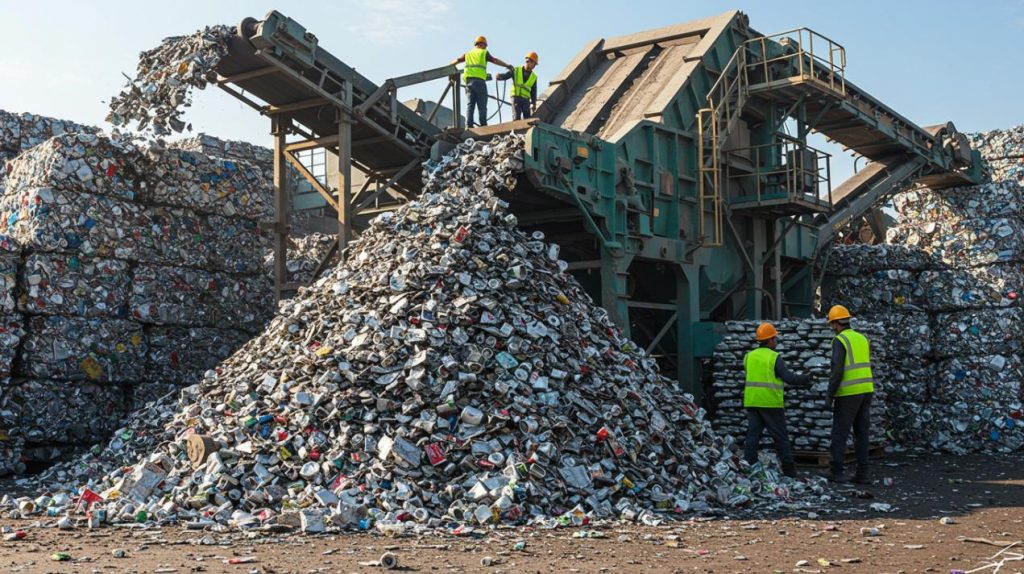Annually, construction sites generate substantial aluminum waste, significantly impacting resource efficiency and economic outcomes. Did you know recycling aluminum consumes 95% less energy than primary production and maintains its properties indefinitely? Adopting effective aluminum waste management practices can lead to substantial savings, reducing disposal costs by up to 60% and boosting overall project profitability. Explore best practices and uncover how your construction operation can maximize economic benefits through smarter aluminum waste management.
The Rising Importance of Aluminum Recycling
In recent years, sustainability has become an imperative in construction management. Aluminum, a lightweight, durable, and versatile material, is highly recyclable, making it an ideal candidate for effective waste management. By understanding the recyclability of aluminum, construction companies can significantly contribute to environmental conservation, sharply decreasing the industry’s overall waste footprint.
Moreover, recycling aluminum consumes only about 5% of the energy required for primary aluminum production. This impressive efficiency translates directly into reduced operational costs and substantial economic savings. As the global focus shifts towards sustainability, recycling aluminum waste offers both a responsible business practice and an economically beneficial solution.
Best Practices for Aluminum Waste Management
Effective aluminum waste management involves several clear, actionable practices that ensure resource optimization. Firstly, establishing clearly labeled waste collection areas onsite facilitates easier sorting and transportation processes. Proper segregation ensures the aluminum scrap remains uncontaminated, maintaining its high recyclability and market value.
Furthermore, construction site managers should maintain meticulous records of generated aluminum waste. Accurate documentation improves traceability and transparency, enabling management teams to analyze waste generation patterns and adjust practices accordingly. This approach helps businesses refine their strategies over time, increasing operational efficiency.
Collaborating with specialized waste management companies is another practical step that construction firms can adopt. These firms leverage professional expertise to ensure maximum aluminum recovery, providing comprehensive solutions tailored to specific project needs. They also enforce compliance with local environmental standards, ensuring seamless operation without legal hassles.
Economic Benefits of Aluminum Waste Recycling
Financially, recycling aluminum waste presents numerous advantages. First, selling recycled aluminum back to suppliers or recycling facilities creates additional revenue streams, directly contributing to profit margins. Construction companies can capitalize on these opportunities by integrating aluminum recycling into their standard operations.
Second, embracing aluminum recycling can reduce disposal costs substantially. Traditional methods of waste disposal, such as landfilling, incur rising fees and stringent compliance costs. Recycling aluminum waste helps companies sidestep costly disposal charges, instead turning a potential expense into tangible profits.
Finally, optimized aluminum waste management positions construction firms positively within the market. A reputation for eco-friendly practices attracts environmentally-conscious clients and enhances competitive differentiation. This positive market positioning can lead to improved business opportunities and heightened demand for services.
Comparison of Revenue from Aluminum Waste Disposal Options
Below is a concise comparison illustrating financial gains associated with two common aluminum waste disposal methods:
| Disposal Method | Average Revenue/Cost per Ton | Environmental Impact |
|---|---|---|
| Aluminum Recycling | +$1000 revenue per ton | Low environmental impact, high sustainability |
| Landfill Disposal | -$150 cost per ton | High environmental harm, regulatory compliance risks |
Implementing Successful Aluminum Waste Strategies
Successfully integrating aluminum recycling policies into a construction firm’s workflow requires clear strategic planning. Initially, it is essential to educate management teams and onsite personnel about the financial and environmental benefits of aluminum recycling. Comprehensive training not only raises awareness but also enhances overall acceptance and participation.
Effective collaboration with recycling providers is crucial. Partnering with a reputable recycling company establishes streamlined processes that save time, effort, and reduce logistics costs. Specialists in aluminum waste management possess industry expertise that ensures the smooth adoption and implementation of recycling practices, providing continuous support throughout the process.
Additionally, leveraging modern technology to aid tracking and documenting aluminum waste proves highly beneficial. Digital tools such as project management software offer real-time insights into aluminum waste volumes, enabling quicker decisions and improving overall operational efficiency.

Challenges and Overcoming Them on Construction Sites
Despite clear advantages, certain challenges can hinder efficient aluminum waste management. For example, issues concerning waste contamination or inadequate sorting processes can diminish the economic value of scrap aluminum. To address these challenges, firms should introduce training sessions focusing specifically on correct sorting techniques and best recycling practices.
Moreover, logistics and storage problems could arise, particularly on constrained construction sites. Optimize onsite storage spaces by periodically shipping collected aluminum scraps to recycling facilities or utilizing specialized containers designed specifically for compact, neat aluminum storage.
Finally, finding trustworthy recycling partners can initially seem overwhelming. Construction firms should conduct thorough research before choosing a recycling partner, ensuring reliability, efficiency, and market competitiveness through online reviews, direct consultations, and referrals.
Sustainability as a Strategic Advantage in Construction
Aluminum waste management presents construction businesses with a sound sustainability strategy, optimizing both environmental responsibility and economic outcomes. Carefully managing and recycling aluminum waste not only reflects positively on your environmental commitments but multiplies your financial gain consistently.
As clients increasingly demand sustainable practices, firms proactive in proper waste handling will undoubtedly stand out in the marketplace. Implementing efficient aluminum recycling and waste management practices is no longer optional, it’s a strategic move that significantly elevates your project’s environmental credentials and your company’s reputation.
Unlocking Aluminum’s Hidden Potential on Construction Sites
The construction industry generates significant amounts of aluminum waste every year. However, what many contractors may not realize is the value hidden within these discarded materials. By strategically managing aluminum waste, construction firms can not only reduce their environmental footprint but also significantly enhance their economic returns. Partner with expert waste management services to boost your site’s profitability and sustainability.


